Thousands of lines of code, months of work, a couple of programming languages, failed rewrite… and we have it - a simple, cross-platform, and easy-to-use monero wallet.
NOTE: This article will be rather technical, so you may want to skip directly to the source code and downloads on GitHub or Gitea
History
This project started as an anonero v1.0 rewrite, which due to a variety of reasons didn’t happen. Now this is a sandbox for experiments, which will hopefully end up as a fairly decent wallet.
But I didn’t want this project to hang or be fully wasted - so here it is.
Motivation
You see - there are a couple monero wallets out there - just as there are a couple of Linux distros, one is based on another, some are made for iOS, some for Android, some run on desktop, some forked other wallets, some support monero among 100 of other currencies, some are even closed source, some use Flutter, some use Qt - there is a variety of wallets available currently, so what do you do when we already have enough wallets on the market? That’s right! It’s the square hole!
But no, seriously: I had my reasons, I wasn’t entirely happy with current implementations, not that they are bad - they just didn’t fit my use case well. You see - xmruw is created entirely from scratch 1 in Dart/Flutter/C++ and due to the absurd amount of code required to configure Gitea Actions (woodpecker ci is a better option that I’ll switch to soon.) you can also add YAML, Dockerfile and bash to the list.
All Possible Options
Before we dig into our implementation let’s see what is on the table currently:
wallet2_api.h-> Official library maintained at the heart of monero-project/monero. Which is used by:simplewallet.cppit looks like it doesn’t use wallet2_api.h
There are probably some wallets I have skipped (sorry, but launching 3 browsers and connecting to tor, i2p, and convincing GitHub and Cloudflare that I am in fact not a robot is an exhausting task) but you can see the pattern here - wallet2_api.h is the main abstraction level provided by upstream and there is monerujo and cake implementation that uses it.
So what you may (rightfully so) think that this is good, we have invented 2 wheels and just reuse them as needed. But is it tho? Let’s take a look at that from another side.
Anonero
Due to privacy and security concerns I and Anonero refused to use cake implementation reddit github this resulted in people losing money - while cw_bitcoin and cw_monero are two separate things, and cw_monero doesn’t (up to my best knowledge) use any logic on the dart side… this left a bad taste.
Luckily anonero team recognized the issue and opted to use the monerujo implementation instead, and was the first and the only wallet written in Flutter to do so, but this created some issues (according to me and no one else if I had touched more Java and Kotlin in then this most likely wouldn’t be a problem).
Let’s say that you wanted to display user balance, wallet2_api.h exposes a function in the Monero::Wallet struct called
|
|
So assuming we have already loaded the library, and opened the wallet then it should be fairly easy right?… Right? Just wallet->balance(0); right?
CPP, Java, Kotlin, Dart, Async, State Management and Debugging…
Well, technically. But remember that anonero is written in Flutter, and not in Java/Kotlin, and while it is possible to use PlatformChannels this creates a significant issue, now to do wallet->balance(0); we need to go through some more steps to get to the wallet2_api.h methods. Let’s reverse the function call path and see where we go.
CPP
Let’s assume that our root implementation is wallet2_api.h, so Monero::Wallet’s balance(0);. There is nothing fancy about this function it accepts optional uint32_t and returns uint64_t.
|
|
CPP<->JAVA
Monerujo is written in Java so the obvious choice for m2049r was to go for JNI, so to get to the function we want we do a trick like this:
|
|
And get a read-to-use function that is available in Java.
Java
|
|
This looks straightforward, uint32_t became an int but yeah it is going smooth for now.
Java(Kotlin)<->Dart
NOTE: Anonero didn’t actually call the getBalance function this way, it used a listener instead (which is a better approach), but for simplicity, I’ll present code that would have been used if we used normal calls, the function we are calling this way is
viewOnlyBalancewhich has a similar signature but does a different thing - for our purpose it is the same thing. I’ll continue to call it getBalance to not cause confusion. If you want to search the source code for the implementation use the function name I have above.
We are in Kotlin now, we will be calling Java code, however. It doesn’t matter as they both are compatible.
|
|
umm.. this is actually pretty verbose, but if you don’t mind the boilerplate code that is copied over you now should have the function available in the next language…
Dart
The dart side of things looks similar - also a class and a few methods.
|
|
So we are ready? Can we build the app finally?
You wish. Didn’t you notice that? Don’t you see that little detail?
Async
If not for the async nature of platform channels we would be ready to go. If not the async nature we could do something like this:
|
|
async version:
|
|
But we have async. And we can’t use that. we can use FutureBuilder instead but this combined with the number of calls that are happening, and delays added by PlatformChannel would cause things like:
- Blinking UI (placeholders loading for a frame or few)
- Hard to read and maintain code (wrapping even the simplest things in FutureBuilders)
since this blog post is supposed to be about xmruw and not anonero (technically xmruw is a failed rewrite of anonero), let’s highlight the last thing
Async performance wise
This is by no means a good benchmark. It is a script I have written in Dartpad and ran locally to confirm that it also makes a difference outside of the browser. But you can see where it is going.
| Iterations | async | future | sync |
|---|---|---|---|
| 1'000 | 0.15171ms | 0.34523ms | 0.00116ms |
| 1'000'000 | 79.10659ms | 201.59368ms | 0.96132ms |
So as can be seen in this not-so-complicated benchmark there is a huge (proportional) cost to using async code. This benchmark didn’t take JNI or do any kind of actual processing on the function side. Just pure async / future/sync functions returning 1.
So it may be a good idea to switch to blocking code for the UI.. which is a strange thing to say but we have three options left now
- Hold the UI manually (effectively making async code blocking, just in a proper way)
- Use FutureBuilders, which for calls that take longer than 1/120s (8.3ms) will cause the frame to render a placeholder and then replace it with something else causing a weird blink.
- Call blocking functions directly. Will the end user notice the fact that the app was frozen for 1 frame? And even if the user will in fact notice that there are not many calls that actually do block for a long amount of time. And even if we do need to call them we can spawn another isolate which will run code without blocking the UI.
NOTE: Anonero used state management which solved the issue but has added a very react-like feel to the source code, so it solved the issue but introduced a DX drawback.
Debugging
Let’s sum the layers of abstraction:
- [CPP]
wallet2_api.h - [CPP<->Java JNI]
monerujo.cpp - [Java]
Wallet.java - [Java(Kotlin)<->Dart PlatformChannel]
WalletMethodChannel.kt - [Dart]
wallet_channel.dart - [Flutter] wrapping async code…
note that none of this code was generated, everything was written, and doing things like type mismatch, or a wrong variable name passed via PlatformChannel will result in a catastrophic event where everything breaks and you have to figure out which layer is a faulty one. You don’t get any IDE suggestions for what functions are available. And anonero has cutting-edge features in it, many patches applied on top of monero-project/monero, which made development harder when we were applying new features - because if something doesn’t work how do you know if it is: wrong text encoding? type mismatch? a simple typo in an object? not using the latest compiled binary?
There was a need for the…
Rewrite
The goal was to simplify the codebase, it did happen but a few things couldn’t be easily brought back, and releasing a rewrite with less (important) features couldn’t happen. But the side product remained, and we have xmruw now.
monero_c
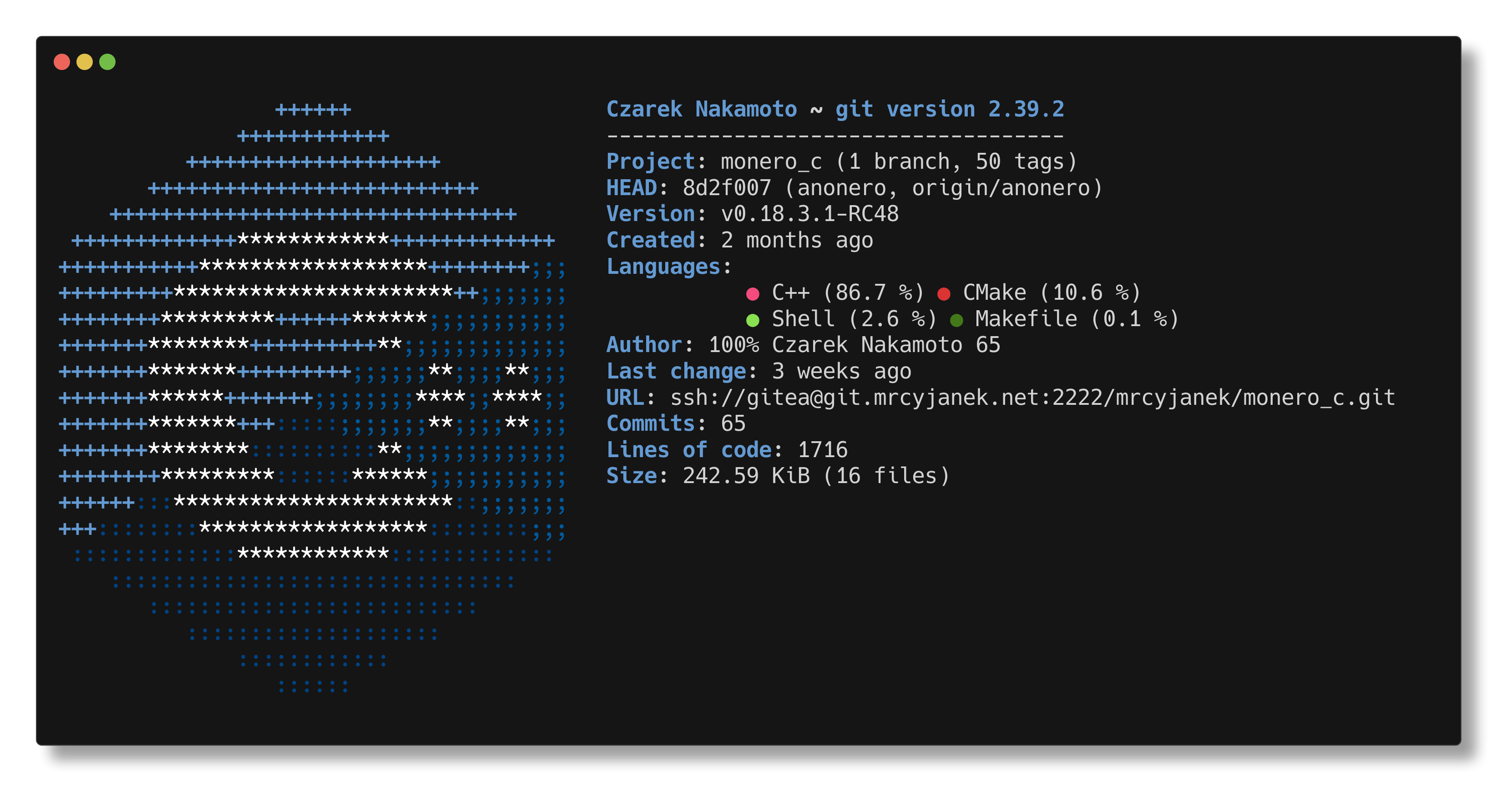
The first goal of mine was to get rid of as many layers of abstraction as possible, the big elephant in the room was the fact that all flutter-based wallets appeared to ignore the existence of dart:ffi and used the JNI. Why did they opt to call functions using Java instead of dart:ffi? Initially, I thought that there were no drawbacks to using it (spoiler alert: there are plenty).
First of all dart:ffi doesn’t support C++, so for this reason I had to write monero_c which wraps the C++ calls into a C header file. It contains many code blocks similar to this one:
|
|
In fact - it contains almost every single function (even more complex ones, that use std::vector).
I have also compiled it for Android, and Linux (alpine soon) on CI so it is trivial to start using it.
Fun fact: initially I asked some people on Fiverr and Upwork to do the wrapper for me because I didn’t want to write C++ code (I have zero experience in it). But after getting hit with poor-quality, often AI-generated work I’ve just gone ahead and written that on my own (by forking some code from monerujo, most notably cmake configuration).
monero.dart
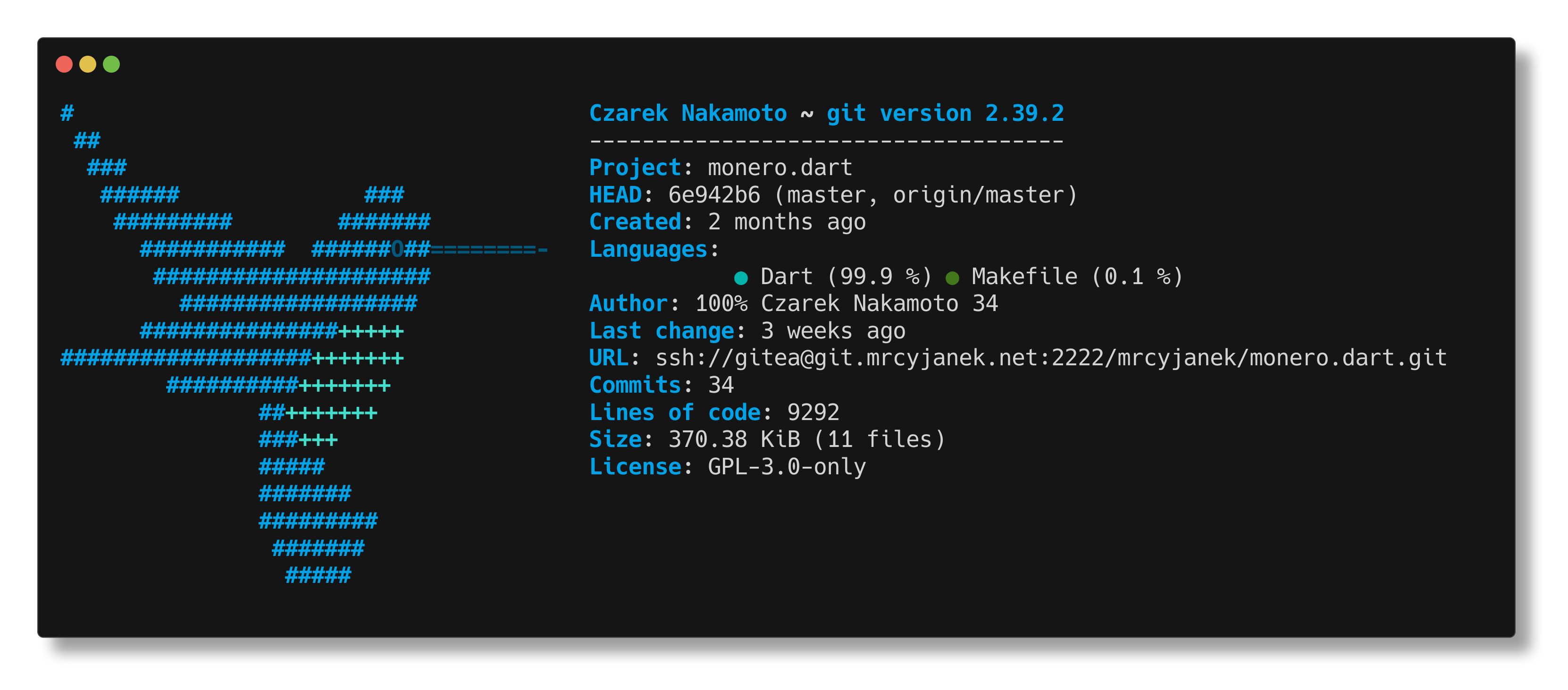
So the natural next step was to use the awesome ffi_gen package to generate Dart code from the wallet2_api_c.h (monero_c) (I didn’t handwrite those 9k lines of code.. but I did some.)
Sadly, for reasons unknown to me ffi_gen doesn’t provide usable functions (at least usable in my opinion) so I had to write a wrapper around them.
|
|
I’ve also added the debugStart and debugEnd functions which came really handy when we had some performance issues. But this example doesn’t really show what kind of code I had to write manually (more than 3000 lines of that…). You see numbers are simple (I know, little endian, big endian, I know. I am aware, but in general when we invite strings into the conversation.. things take a nasty turn.)
|
|
Not only do we need to cast ffi.Char to ffi.Utf8, but we also need to call .toDartString()… and guess what? Not all strings are Utf8 so we need to catch any potential errors (or we risk crashing the main isolate (for non-dart devs: main thread crash)).
But this isn’t the worst-case scenario. It’s getting even funnier.
|
|
Here we need to .toNativeUtf8() and cast it to ffi.Char because what the heck is ffi.Utf8? Not only that but I also need to manage my own memory (dart is garbage collected) because why not? And I get why it is done this way even in the scope of monero-project/monero std::string is used to carry arbitrary data - but still it would be nice to have something generate that code for me. But anyway, it’s written so I no longer care that much.
flutter-monero_libs

We need some way to bring the libwallet2_api_c.so into the proper location on Android (and possibly on Linux and other desktop operating systems too but I have not done that because I am afraid of writing more cmake).
Note: up to my best knowledge we actually don’t have to do it, we can load .so without executable permissions so we can
- download it
- keep it compressed and uncompress it on the first run
- potentially allow beta-testing of new versions of the library without updating the app.
But Google has implemented W^X protection that I have to comply with to get my app to Google Play, and it would be very not-nice to violate the policy that broke Termux (broke the useful legit use while keeping the malicious use intact)
anonero_backup
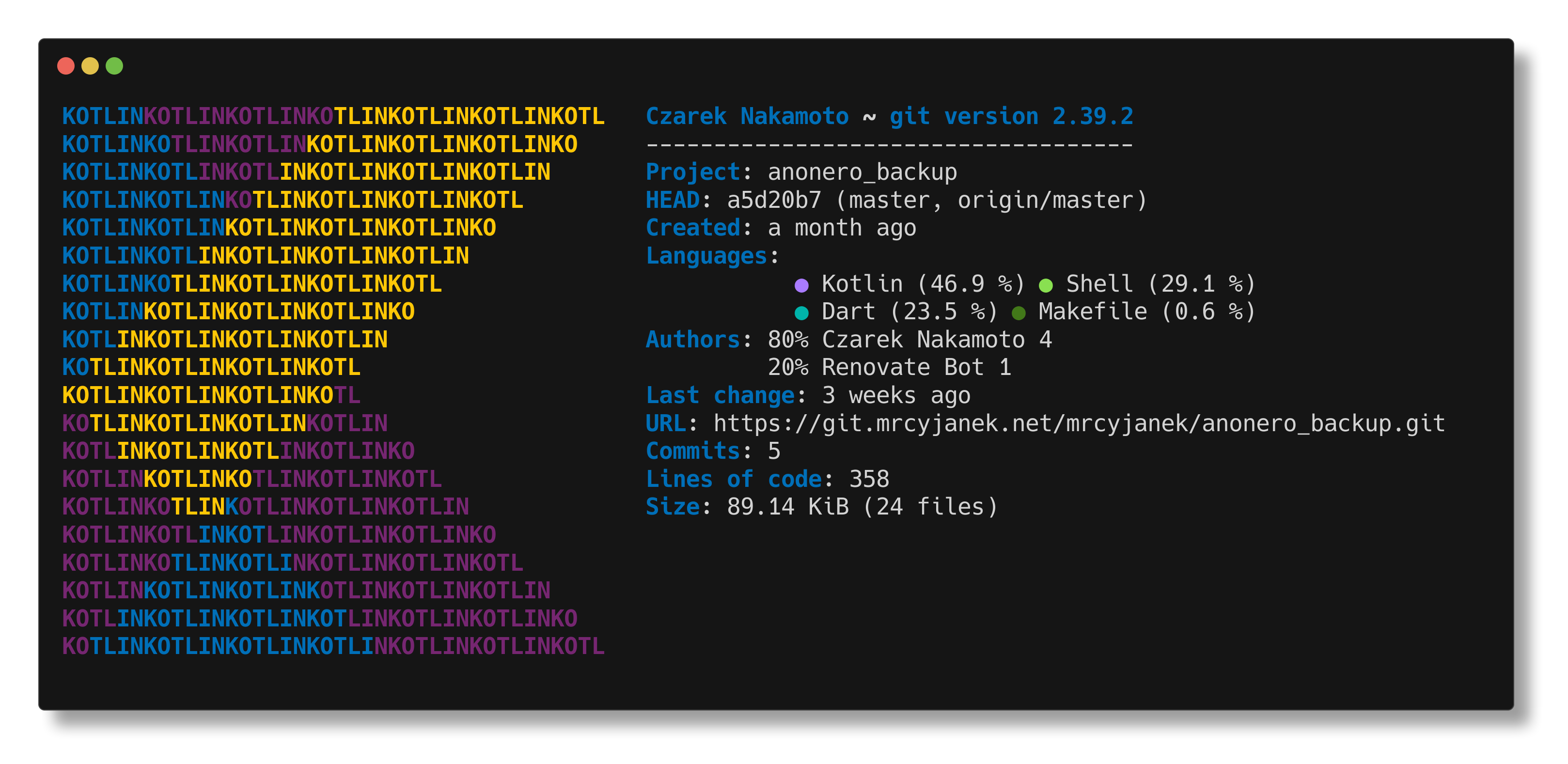
Since this started as a rewrite of anonero I had to implement a backup/restore mechanism that is compatible with the v0 version of anonero. I’ve decided to put all cryptographic functions into a separate repository to avoid rewriting cryptographic functions from scratch and to make sure it is 100% compatible. This way I have also managed to not put any Kotlin/Java code inside of the main project repository and I have left the core functions intact.
bytewords
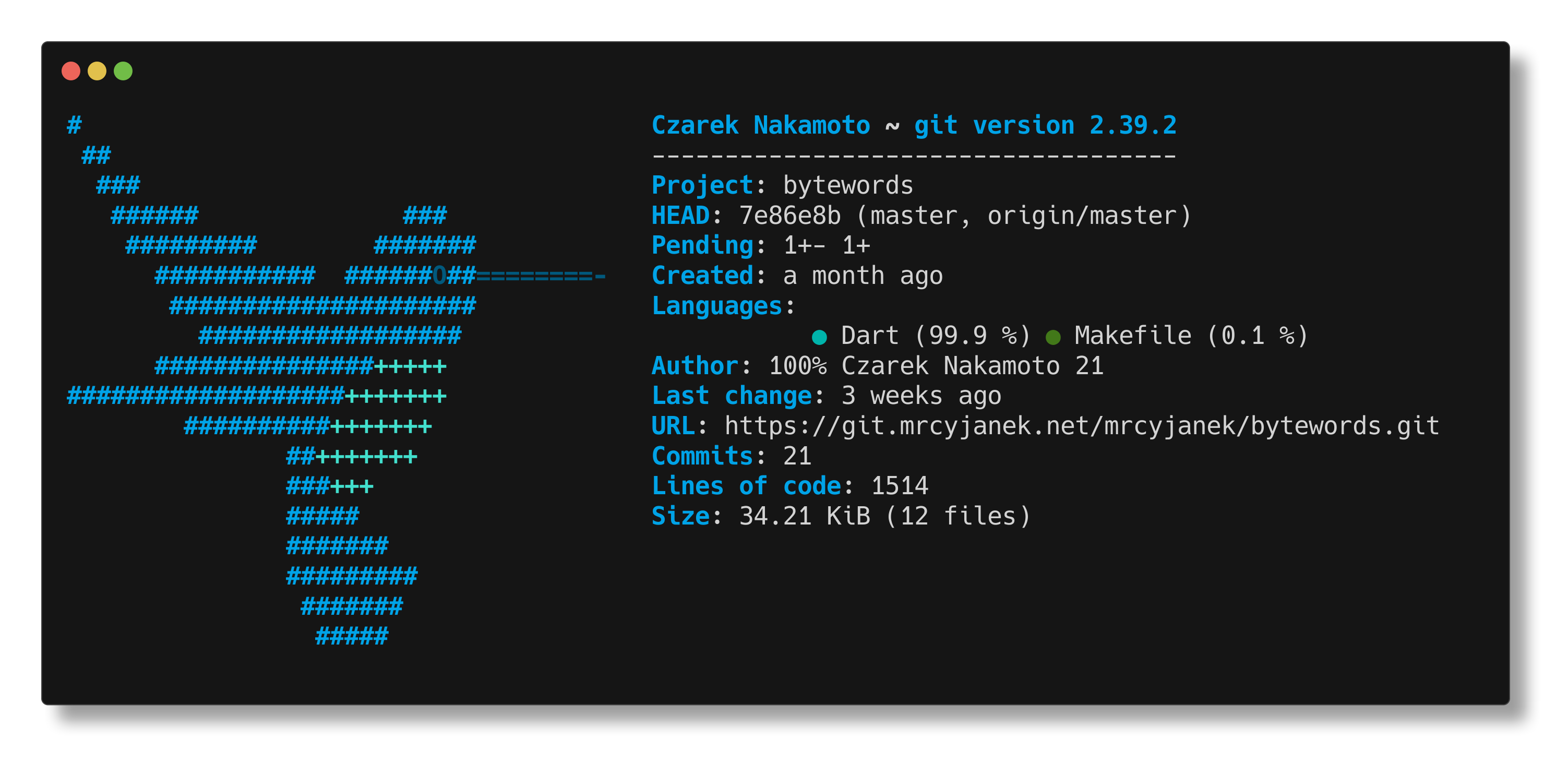
Bytewords (BlockchainCommons/Research/papers/bcr-2020-012-bytewords.md) also got implemented in a separate package because it may be useful to other wallets (and possibly other projects using UR).
This package also needs some extra testing so it makes sense to separate it from the core codebase.
unnamed_monero_wallet
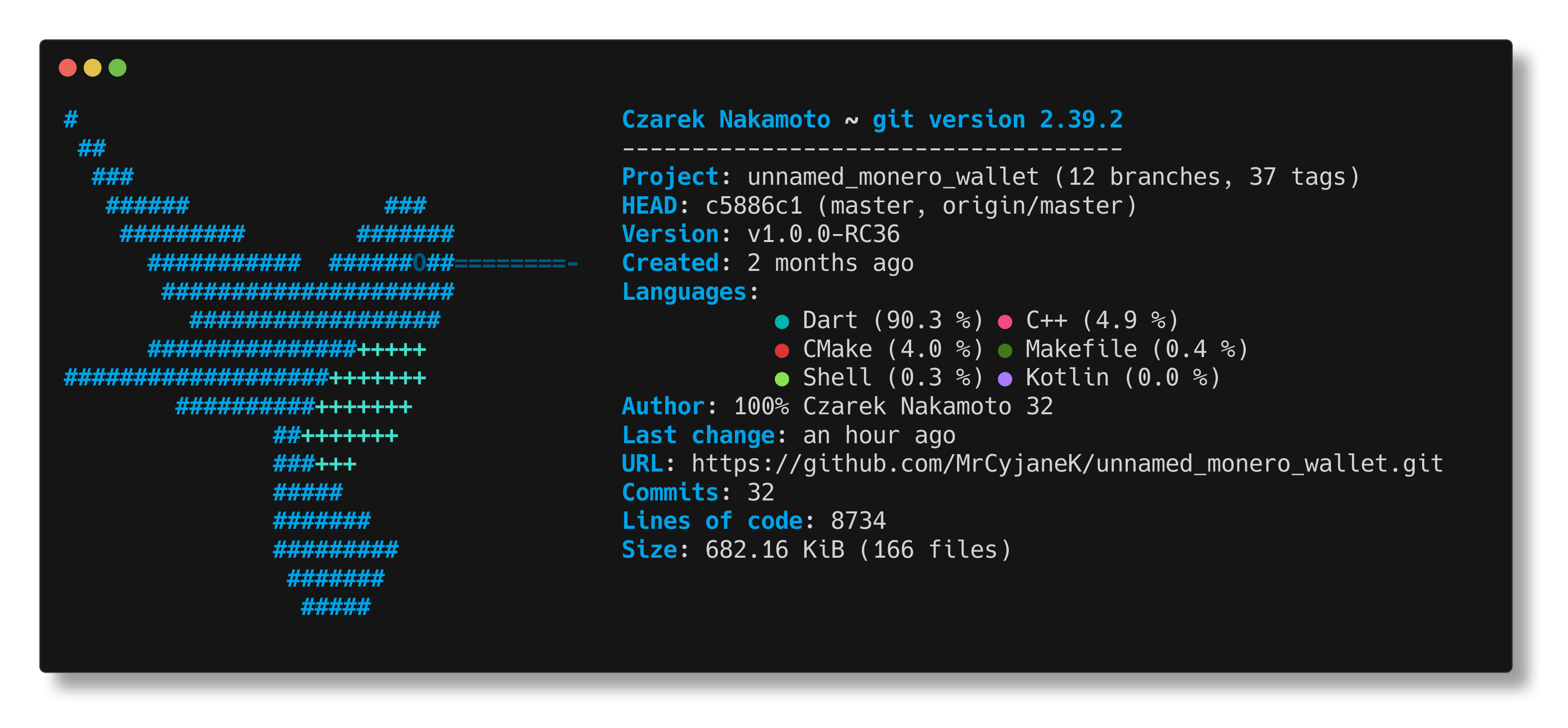
FINALLY Once we have everything in place we can put up the wallet into one large piece. I have focused strongly on the code to be simple to add new features, I have made it portable (it runs on Linux and Android), and focused strongly on debugging.
Now to toss in a new feature2 all we need to do is to create a monero_c update (which is really just a bit of boilerplate around the C++ code), and run the code generator that is configured in monero.dart repository and we are ready to use it in our wallet.
- [CPP]
wallet2_api.h<- unavoidable - [CPP<->C]
monero_c (libbridge)<- avoidable if monero-project/monero would provide C headers. - [Dart]
monero.dart<- unavoidable
Now we are only one extra step away from the upstream, and due to the nature of ffigen we get full LSP support and IDE integration - if something is semantically broken it won’t compile.
Also, the code is blocking by default - this may cause some UI lags, but thanks to the performance debug screen we can easily spot which function is causing the issue and make it async by throwing it into an isolate.
As a bonus I have also entirely got rid of any state management - everything is a call to native monero function. Why? Because it is so damn fast.
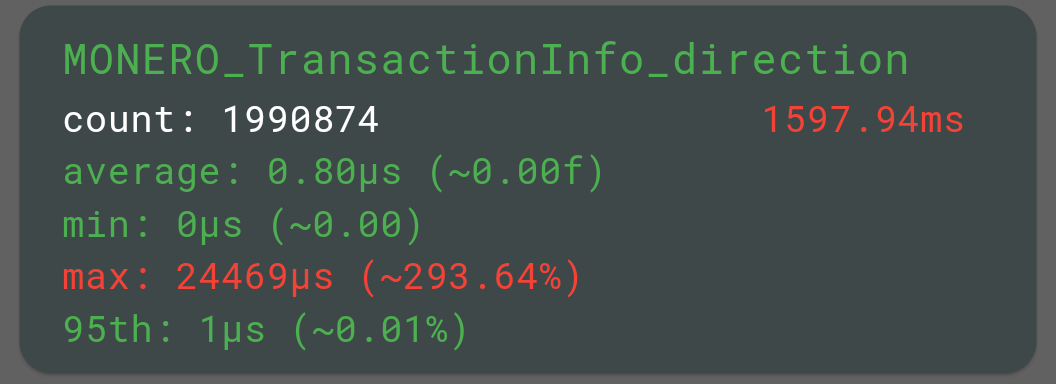
This function is (intentionally) called much more frequently than it is needed, it is called for every transaction in the wallet, and it takes 0.80µs on average to process the call.
NOTE: I am aware of the large max: value, this function is called instantly after the wallet opens/unlocks (exists background sync mode) so my guess is that it is sitting on some mutex, as once the wallet is opened it doesn’t take that much time to call.
These kinds of logs are stored for every single function call, so if something goes wrong and the app lags - we know why, if some function crashes - we know which one 3.
| screen 1 | screen 2 | screen 3 |
|---|---|---|
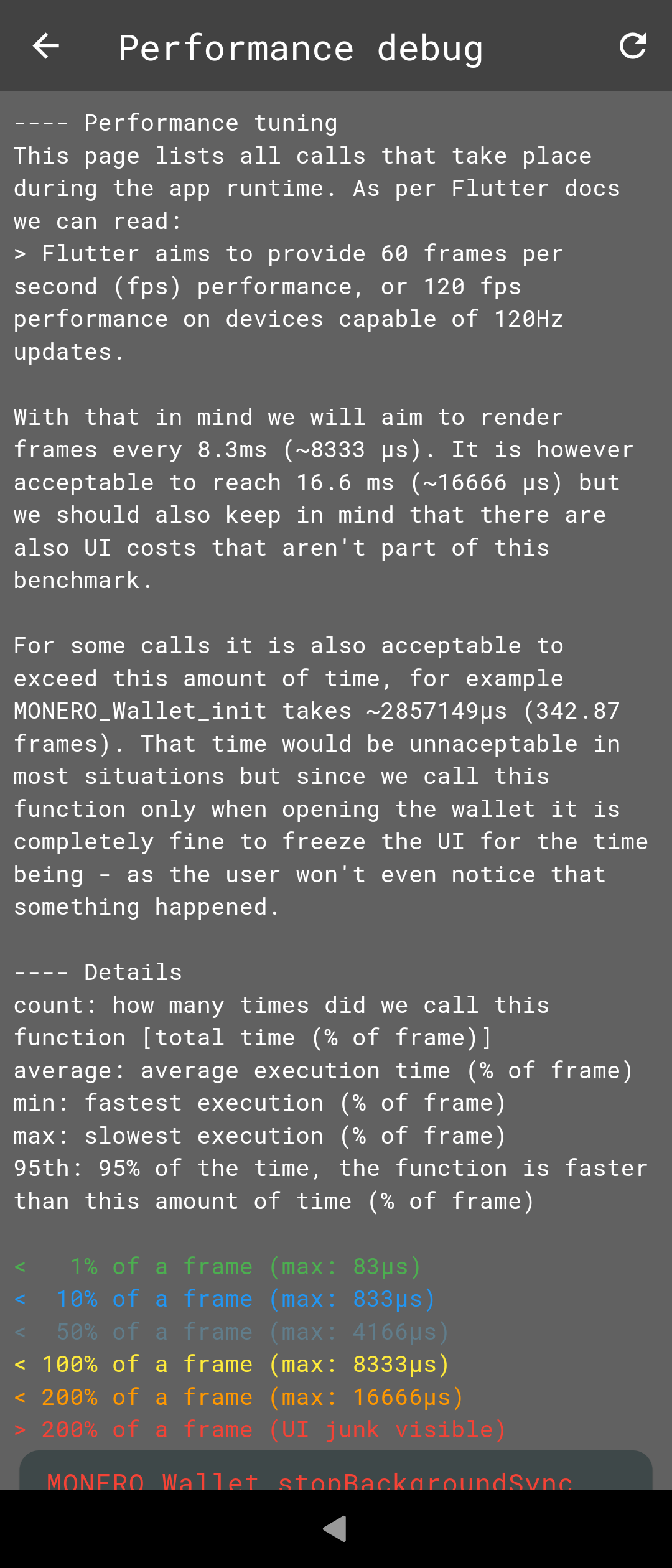 |
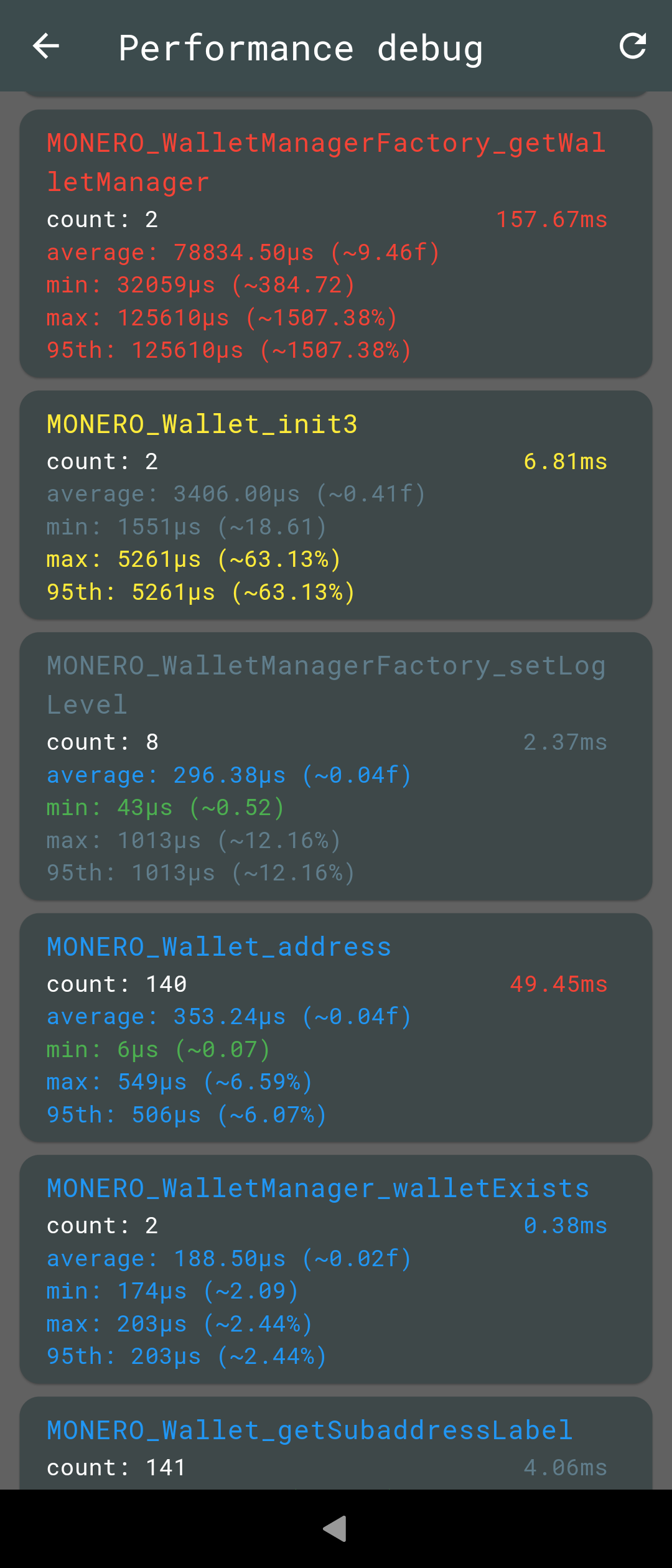 |
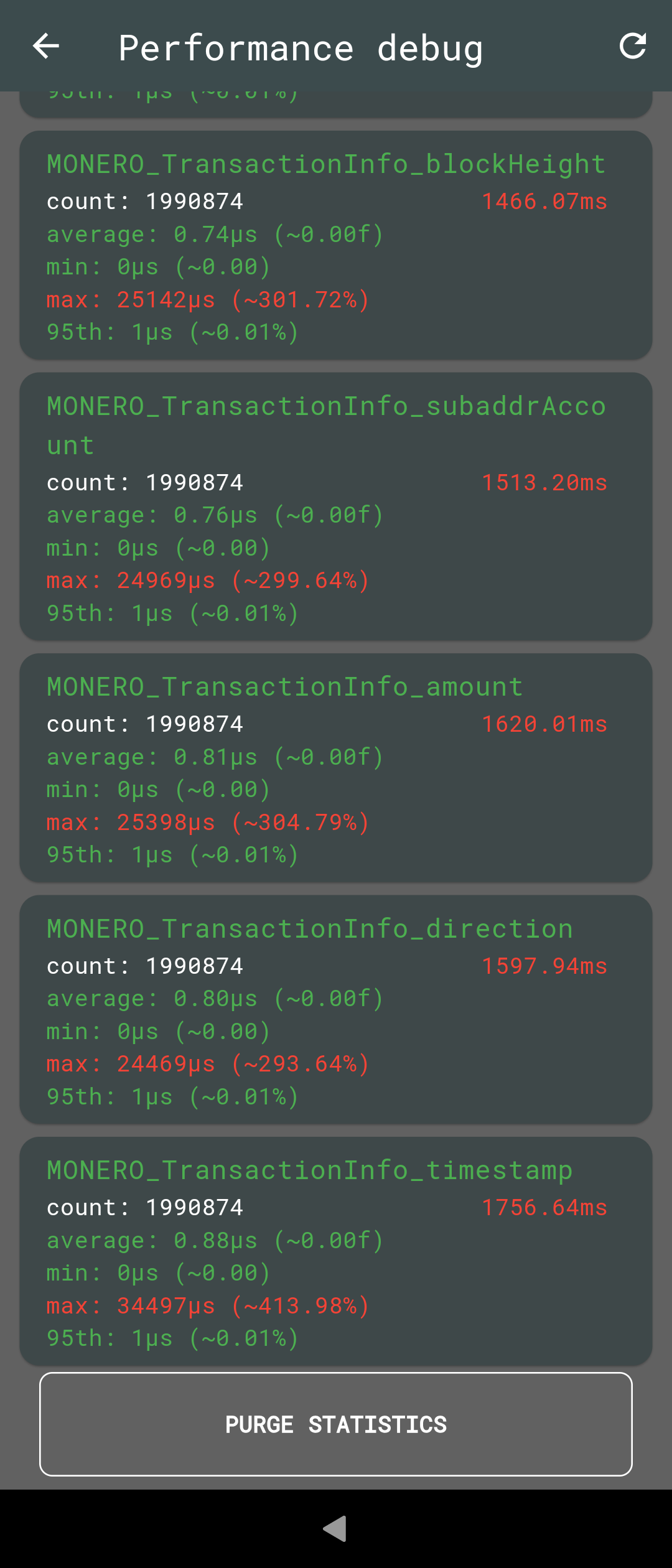 |
There are still some rough corners around the apps, and some random crashes occur from time to time, but with UI being one extra step away from the upstream codebase I’m pretty sure that we can do a very rapid development.
If you like the idea feel free to test the wallet, leave a star, join chatrooms, or donate. All links can be found in the README.md
